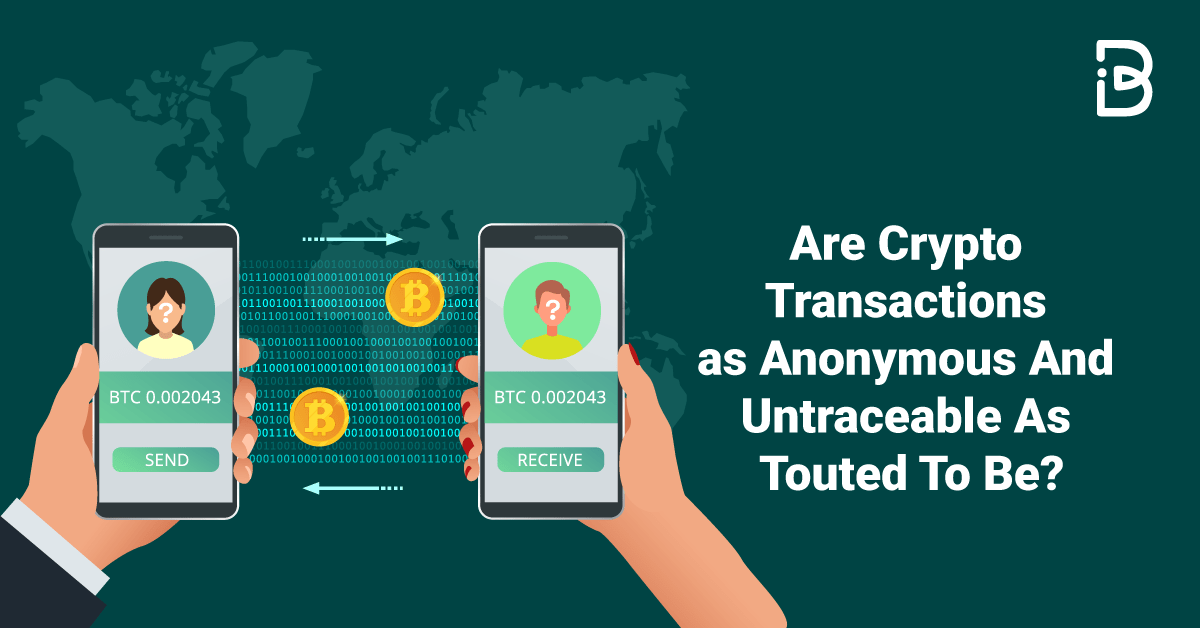Blockchain transactions are not anonymous but pseudonymous, as all transactions are recorded and visible on the public ledger. Blockchain transactions are not truly anonymous, as they are recorded publicly and can be traced back to the individual involved.
While the use of pseudonyms provides some level of privacy, it is not foolproof, and with smart searching of the blockchain, real-world identities can be uncovered. Despite the perception of anonymity, cryptocurrencies like Bitcoin are more accurately described as pseudonymous rather than completely anonymous.
This distinction is important for understanding the level of privacy and security that blockchain transactions offer. We will explore the transparency of blockchain transactions and the implications for user privacy and security in the crypto realm.

The Illusion Of Anonymity
Blockchain transactions are often believed to be anonymous, but in reality, they are not completely hidden. The transparency of the blockchain allows anyone to view all transactions recorded on the public ledger. This means that all transactions can be traced and analyzed by anyone interested, including government agencies and investigators.
Even though cryptocurrency wallets use wallet addresses instead of personal information, it is still possible to identify individuals through their wallet addresses. Centralized crypto exchanges share customer data with agencies like the IRS, which can be linked to specific wallet addresses.
While most cryptocurrencies, including Bitcoin, are pseudonymous, not anonymous, it is still possible to uncover real-world identities behind wallets through smart searching of the blockchain. This highlights the importance of understanding the level of privacy and anonymity a cryptocurrency can provide.
Tracking Blockchain Transactions
Blockchain transactions are not completely anonymous. The transparency of the blockchain enables anyone to view all transactions, making them accessible to the public and government agencies. The public ledger records all transactions, providing transparency and traceability. Despite the use of pseudonyms, blockchain explorers and investigators can trace the flow of funds, uncovering potential illicit activities. Centralized crypto exchanges share customer data, including wallet addresses, with government agencies, increasing exposure. Therefore, it’s crucial to understand that blockchain transactions are not entirely anonymous and can be traced through analysis and public accessibility.
Tracing Transactions
Can blockchain reveal your identity? The transparency of the crypto realm is often a good thing, but it’s always worth noting that your transactions will almost never be untraceable due to blockchain explorers, and there is a chance of your identity being uncovered through your wallet address.
Can your identity be uncovered via your crypto address? By analyzing the blockchain, which is a decentralized ledger that records all transactions, investigators can trace the flow of funds and identify suspicious or illegal transactions. This process allows them to uncover criminal networks involved in money laundering, fraud, or other illicit activities.
Can transaction in blockchain be traced? Yes, anyone can see all transactions in a public blockchain ledger. This is because public blockchains are transparent, meaning that all transactions are recorded on the blockchain and are publicly accessible. Most cryptocurrencies, including Bitcoin, are not anonymous but pseudonymous, not hiding your identity as much as giving you a fake one. While a pseudonym can hide you, it’s not foolproof, either. Through some smart searching of a cryptocurrency’s blockchain, you could find out the real-world identities behind wallets.
Visibility Of Blockchain Transactions
| Visibility of Blockchain Transactions |
|
The transparency of the crypto realm is often a good thing, but it’s always worth noting that your transactions will almost never be untraceable due to blockchain explorers, and there is a chance of your identity being uncovered through your wallet address. Blockchain transactions are recorded on a public, distributed ledger, which makes all transactions open to the public. Centralized crypto exchanges share customer data, including wallet addresses and personal data, with government agencies.
Most cryptocurrencies, including Bitcoin, are not anonymous but pseudonymous, providing a fake identity instead of fully hiding your identity. While a pseudonym can offer some degree of protection, it is not foolproof. Through smart searching of a cryptocurrency’s blockchain, it is possible to uncover the real-world identities behind wallets.
The ability to trace blockchain transactions allows investigators to uncover criminal networks involved in money laundering, fraud, or other illicit activities. However, it is important to note that anyone can see all transactions in a public blockchain ledger, as public blockchains are transparent and accessible to the public.
Debunking The Myth
Blockchain transactions are often perceived as anonymous, but in reality, they are not entirely untraceable. Due to the public nature of blockchain ledgers, transactions can be tracked and potentially linked to individuals through wallet addresses. This transparency, while beneficial, can also expose your identity in the crypto realm.
| Blockchain transactions are not completely anonymous. |
| The public ledger allows for transparency but not full anonymity. |
| Identification can occur through wallet addresses on the blockchain. |

Frequently Asked Questions On Are Blockchain Transactions Anonymous
Can Blockchain Reveal Your Identity?
Blockchain transactions are not anonymous. Your transactions can be traced through wallet addresses on the blockchain.
How Are Blockchain Transactions Tracked?
Blockchain transactions are tracked on a public ledger, making them open to the public and government agencies. Through blockchain explorers, anyone can view transactions, and investigators can trace funds to identify illicit activities. However, transactions are not entirely anonymous, as they can be linked to wallet addresses and personal data.
Can Transaction In Blockchain Be Traced?
Yes, transactions in blockchain can be traced through the decentralized ledger and blockchain explorers, allowing the identification of suspicious activities.
Can Anyone See Blockchain Transactions?
Yes, anyone can see all transactions on a public blockchain ledger. Public blockchains are transparent, recording all transactions publicly.
Conclusion
In the world of blockchain transactions, anonymity is often a misconception. While cryptocurrencies like Bitcoin provide pseudonymity, meaning they can offer a false identity, it is not foolproof. Blockchain explorers and government agencies can trace and uncover transaction details and potentially link them to real-world identities.
The transparency of the blockchain is a double-edged sword, benefiting accountability while also raising concerns about privacy. It’s important to understand that blockchain transactions are not completely anonymous but rather pseudonymous, requiring caution when engaging in digital transactions.

